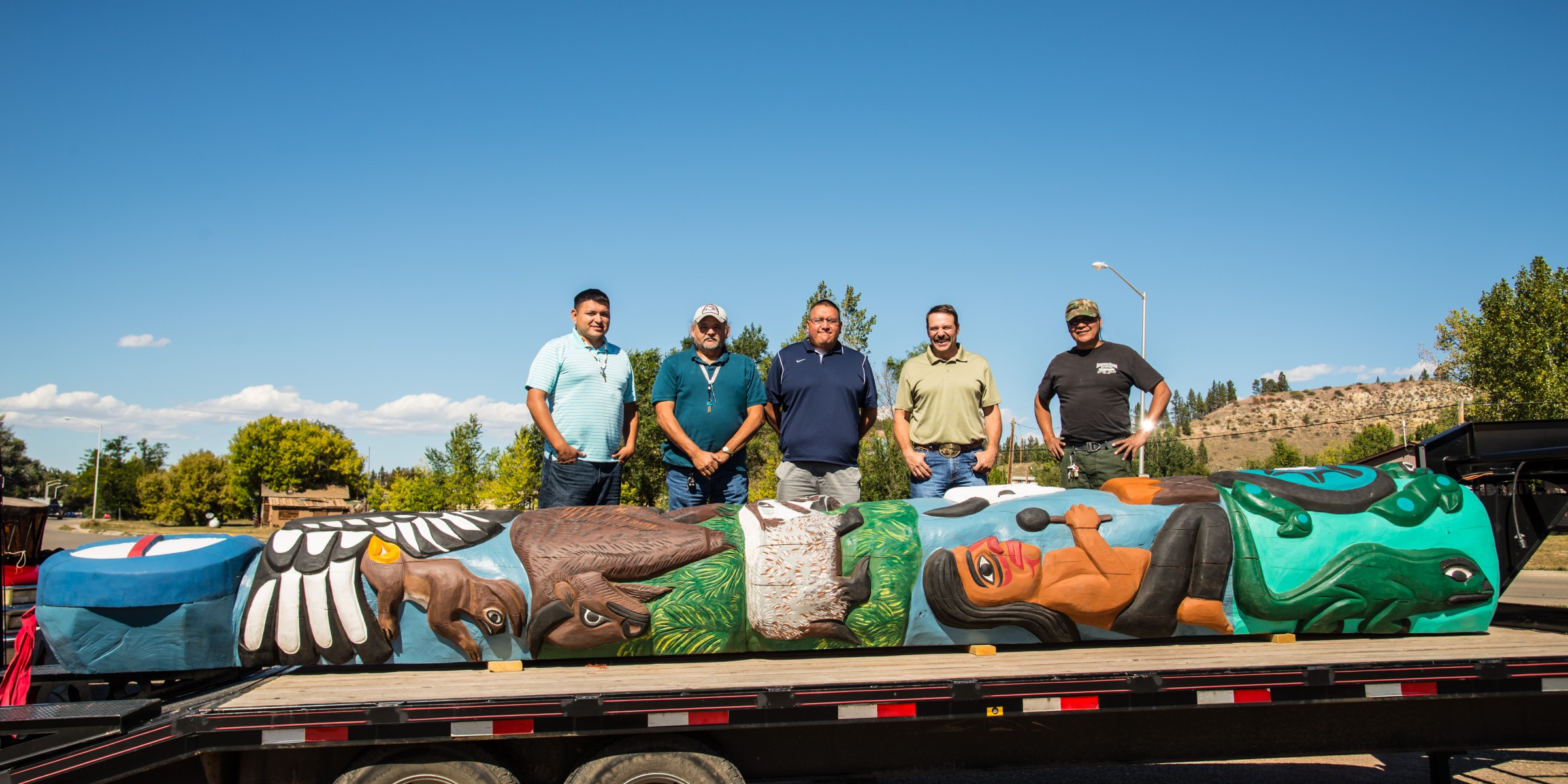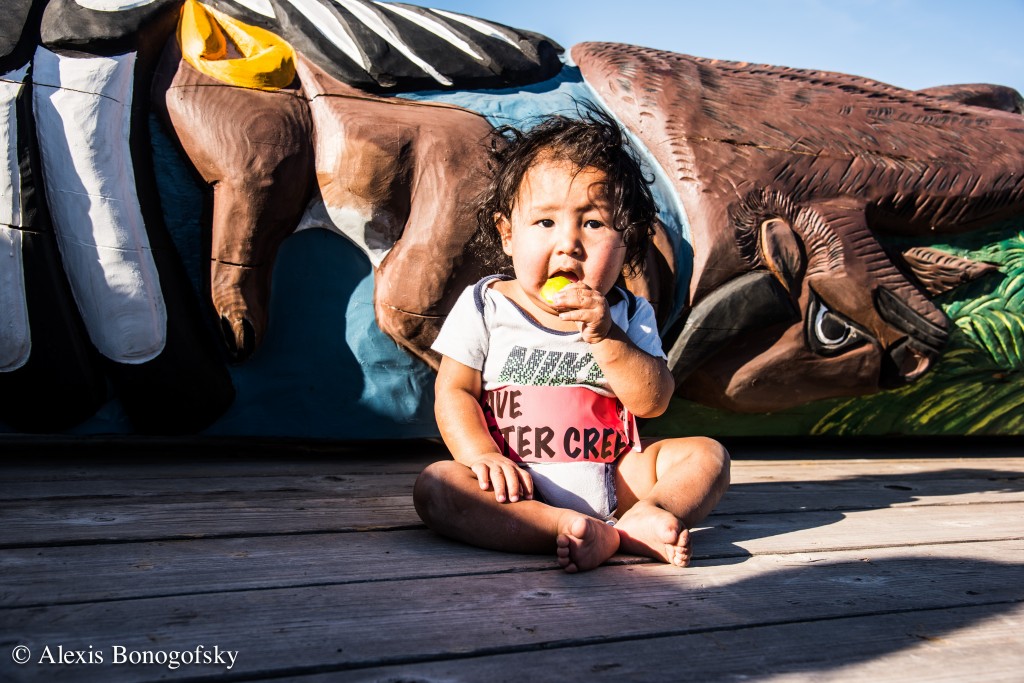It Changes Everything

“If there is any hope for the world at all, it does not live in climate change conference rooms or in cities with tall buildings. It lives low down on the ground, with its arm around the people who go to battle everyday to protect their forests, their mountains and their rivers because they know that the forests, their mountains and their rivers protect them. ” – Arundhati Roy.
On Monday, I sat on the bench just outside the Northern Cheyenne Tribal Council chambers. At 12:24 my friend who was in the room walked out and held up his fist; the Northern Cheyenne Tribal Council voted unanimously (9-0) in favor of a resolution introduced by Councilman Conrad Fisher to oppose the Tongue River Railroad. I turned and looked down the hallway to the north to see the totem pole carved by Jewell James of the Lummi Nation for the Northern Cheyenne people arrive in the parking lot. Then, I cried.
We have come so far in the almost six years since the Otter Creek coal tracts were leased to Arch Coal in March of 2010. After the Montana State Land Board voted 3-2 to lease the coal, there was a sense of resignation and inevitability; the coal would be mined, the railroad built. Many people felt powerless, not in the general, overwhelming global forces sort of way, but in a very specific way caused directly by that vote.
If you remember, the public, both in southeastern Montana and across the state, was overwhelmingly opposed to the leasing of the Otter Creek tracts. Tens of thousands of comments were submitted against it, there were packed public hearings, rallies, you name it, yet we lost the vote anyway.
Then, on the very same day, the same elected body voted to protect the Flathead River from coal mining. The Flathead River is special and the Tongue River, well, those people should be grateful for the economic development opportunity we’re giving them.
This is not a new story east of Billings. It is a story that has been recited to us since the 1970s and it’s powerful. It defines how we think about the problems in our communities and also tells us what the solutions are. This story doesn’t like to be challenged.
We hear it loud and clear. The storytellers say our worth is based on what is under our feet: burn it, mine it, sell it. They tell us it is the best we’re gonna do and we should be grateful because they are giving us the opportunity to fight for the scraps from corporations as they dig up the land and ship it overseas. They tell us to take what we can get.
No more. We are changing the story.
Luckily for the world, there are fighters in southeast Montana keeping billions of tons of coal under the ground because they love that land. The old story is losing its power.
This vote didn’t just arise out of the ether although I’m sure many decision makers were surprised by it, especially those from the Surface Transportation Board and the State of Montana. However, they wouldn’t have been surprised if they had paid attention to what was happening in southeast Montana the last six years.
The vote was, in a sense, the inevitable outcome of thousands of volunteer hours that Northern Cheyennes spent organizing, gathering signatures, cooking for feeds, setting up and taking down events, talking to friends and families, traveling and speaking at public meetings, singing, drumming and praying. This is what community organizing looks like.
A lot of people want to know what the vote means. I’m obviously not Northern Cheyenne but I’ve been lucky enough to walk alongside those fighting to protect their homelands. To me, this vote means that community organizing works. It means that when you engage people without fear, with an open heart and without prejudice you not only gain allies, you build community. It means people understand that the land and water are more valuable than anything that can be taken and sold from it.
It means the Northern Cheyenne Tribe and its people are keeping billions of tons of coal in the ground and they should be honored for their actions.
The fight is far from over. The proposed Otter Creek mine and Tongue River railroad are not dead yet but we are getting closer. The difficult part in front of us is creating a sustainable economy that works for people in southeast Montana. We know we won’t get much help from the state of Montana as they are still stuck reading the old story.
But, as Naomi Klein said the other day, “difficult is not the same thing as impossible.”
This is the last day to submit comments to the Surface Transportation Board regarding the draft EIS for the Tongue River Railroad. You can submit online comments here.


Alexis, I’m so proud of you for all you do and how passionate you are about our environment and the people around you. You are the Best!
Hello Alexis,
You bring good news, and as always so well written.
I would like to take exception, however, to your quote from A. Roy. Mr. Roy to the contrary, there is as much hope for environmental progress in the cities of tall buildlngs as in the beautiful lands of Montana. In fact, the average resident of Manhattan does far less damage to the environment in their daily living than the average Montanan, no matter how much she might love her streams and mountains. The Manhattan uses far less fossil fuel for transport (public transport vs. big pick up trucks) and for habitation (apartments with one side exposed to the weather rather than a house with all six sides — roof, underfloor, four walls — exposed, Many people within cities organize and work hard for the environment, in small and big ways from cleaning beaches to battling for the expansion of low impact transport options to campaigning for increased resource efficiency.
Bless you guys for your fight against coal extraction. Please be glad that those of us who live in urban places you might not even want to visit are with you. There you are.
David Gerstel
A friend sent just the first paragraph of your blog, on the vote by the Northern Cheyenne and the totem pole arriving the same time. I want you to know that I cried with you when I read that paragraph. It is so incredibly hopeful. Thank you.
To Mr. Gerstel: While there is so much organizing going on in the cities, Ms. Roy is still right. Those who fight the hardest are the ones with arms intertwined with the land, water and mountains.
Alexis – beautifully written! What you say makes me want to puff up my chest just a bit for the tiny role that I have played. It doesn’t matter where we live, be it New York City, Seattle, Portland, Lame Deer, Otter Creek, here in Bellingham or any of the thousands of points in between. What I’ve learned is this: take action, participate. It can be as simple as making a phone call, writing a letter to a newspaper, attending a council meeting, hanging from an anchor chain on a ship heading out to drill in the Arctic or donating to help defray costs of an organization or individual.
I had the amazing experience to attend the People’s Climate Change March just a year ago. The people of New York City were great. For two days before the March we tried to do our small part by trying to pass out fliers with the time and location. Everyone we stopped already knew about the March and were participating or wished they could.
I was asked several times back home if it mattered. My answer was always yes. Yes because 450,000 people are sending out ripples strong enough to prompt a Pope’s Encyclical, a discussion between two world leaders, or strengthening the alliances between faith groups, NGO’s, tribes, or Cowboys and Indians.
Pingback: What can eastern Montana teach us about organizing? | east of billings